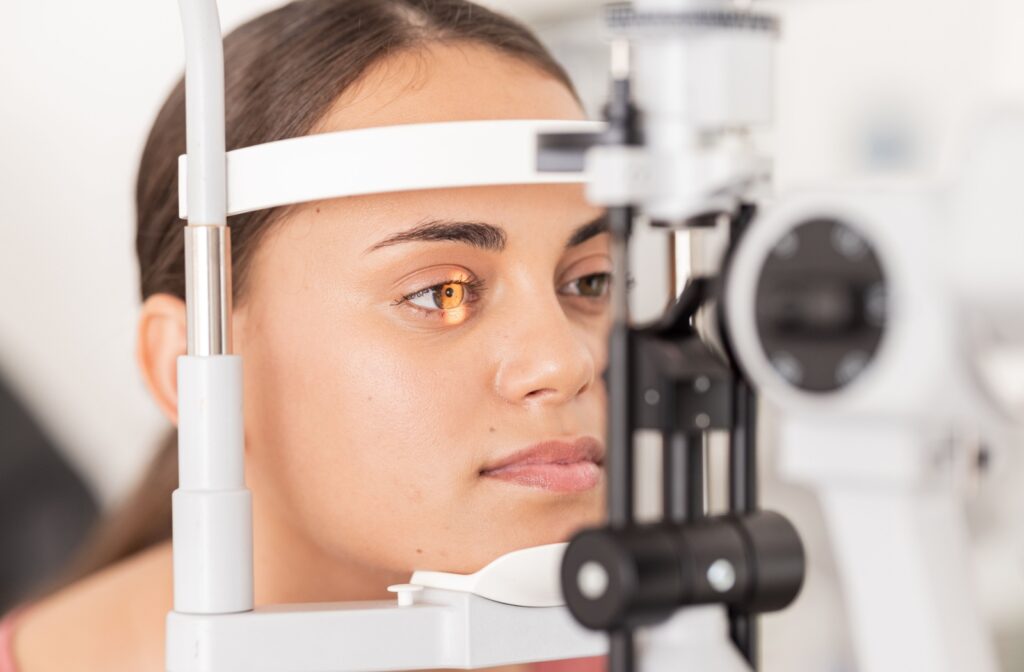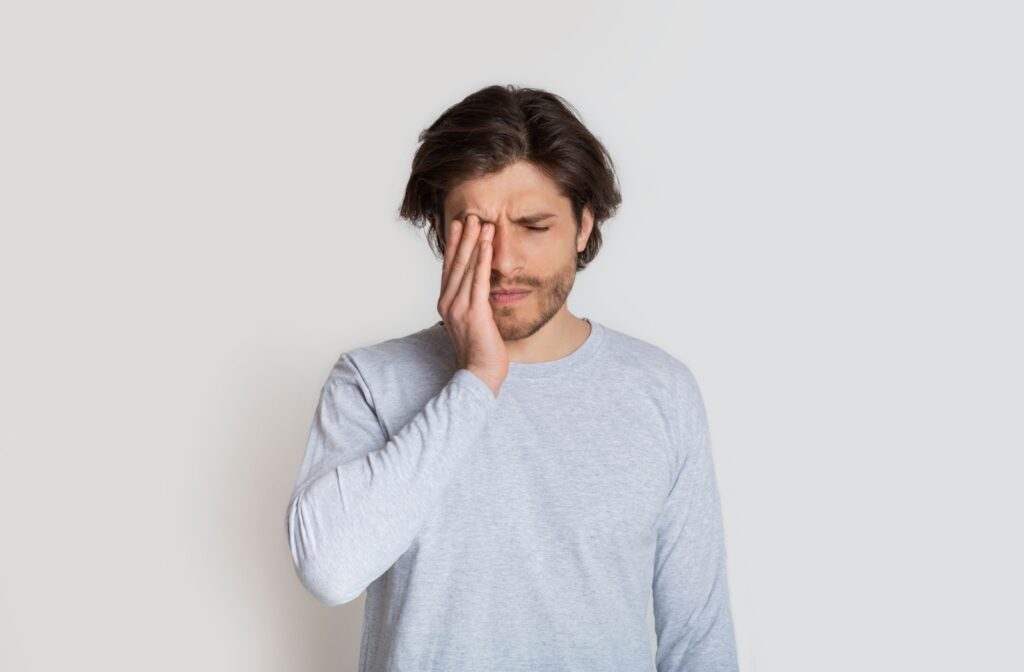Many of us have experienced the irritating, stingy discomfort of dry eyes, especially during certain activities like working on a computer for long hours, staring at our phones too much, or traveling in the conditioned environment of an airplane.
However, there’s a growing concern among adults who suffer from chronic dry eyes: Can this seemingly innocuous ailment lead to blindness? Before you panic, it’s essential to differentiate between occasional dry eyes and chronic dry eye syndrome and understand the steps you can take to prevent severe consequences.
Dry eye itself can affect your eye health, but it doesn’t cause blindness. However, complications from chronic dry eye may lead to other conditions that could possibly cause blindness.
Understanding Dry Eyes
Dry eye occurs when your eyes don’t produce enough tears or when the tears evaporate too quickly. This condition can lead to inflammation and damage to the eye’s surface—an essential component for clear vision.
The tear film is a complex structure on the surface of the eye that’s crucial for maintaining healthy vision and comfort. It consists of 3 layers that include a mucus layer, which coats the cornea, the center aqueous layer, and a lipid layer that prevents excessive evaporation. When these layers aren’t functioning correctly, whether due to insufficient tears, poor quality, or other factors, dry eye symptoms emerge.
The most common causes include aging, biological sex, certain medications, and other systemic health conditions, such as Sjögren’s syndrome. Symptoms can range from a gritty, burning sensation to excessive tearing as a rebound response.
How Dry Eyes Impact Vision
The first thing people with dry eyes usually notice is some kind of discomfort, redness, or irritation in their eyes, particularly during tasks that demand concentration. Vision might become blurry or hazy, leading to an instinctive squinting to improve focus.
While this might sound more irritating than dangerous, the impact on daily living can be significant, and the strain is a sign that your eyes are not producing or maintaining tears properly.
Is There a Link Between Dry Eyes & Blindness?
Studies suggest that severe, untreated dry eyes can lead to damage of the cornea and other parts of the eye. In particular, keratitis (inflammation of the cornea) and corneal ulcers (open sores on the cornea) can occur, leading to vision complications and, in rare cases, blindness.
Keep in mind that the vast majority of dry eye cases don’t lead to blindness. The progressive damage that could potentially lead to vision loss is typically associated with extreme cases that have gone untreated for an extended period.
Most people with dry eyes respond well to treatments such as artificial tears, prescription eye drops, or lifestyle changes, effectively preventing any significant risk to their long-term vision.
Preventive Measures
Managing and treating your dry eye symptoms can reduce the risks and discomfort associated with chronic dry eye. Prevention measures may include:
- Taking regular breaks during activities that cause eye strain
- Ensuring proper nutrition and hydration
- Using a humidifier in dry environments
- Wearing wraparound sunglasses to protect your eyes from wind and sun
- Avoiding direct airflow from hair dryers, car heaters, and air conditioners
Treatments for Dry Eye
There are numerous treatments and methods available to address dry eye syndrome, ranging from simple home remedies to in-office dry eye treatments from your eye doctor.
Medicated Eye Drops
Artificial tears and prescription eye drops can supplement your natural tear production. For some individuals, over-the-counter eye drops are sufficient. However, more severe cases may require prescription medications that can address inflammation and promote tear production.
Punctal Plugs
These are tiny, biocompatible devices placed in the ducts of the eyes to slow the drainage of tears, which can help keep the eyes moist and reduce dry eye symptoms.
Lid Scrubs
Keeping the eyelids clean can prevent tear production glands from becoming clogged, therefore improving the quality of tear film.
Amniotic Membranes
This innovative treatment involves placing a patch made from human amniotic membrane on the eye to reduce inflammation and promote tissue regeneration.
TearCare
TearCare is a new approach to treating evaporative dry eye that involves applying heat to the eyelids to help the lipid glands produce the needed protective oil layer for the tear film.
IPL Therapy
Intense pulsed light (IPL) therapy is an innovative treatment for dry eye symptoms caused by meibomian gland dysfunction (MGD). By using pulses of light, this therapy unclogs the meibomian glands, offering relief for this common underlying cause of dry eye.
RF Treatment
Radiofrequency (RF) treatment is another approach for combating dry eye symptoms stemming from MGD. RF uses high-frequency electrical currents to gently stimulate and rejuvenate the meibomian glands.
Serum Tears
These specialized eye drops, derived from the patient’s own blood, offer unique benefits for addressing dry eye. Compared to regular eye drops, serum tears show better results in lubricating the eyes and even promote epithelial healing.

Visit Bluebird Vision + Wellness for Dry Eye Care
Living with chronic dry eyes doesn’t have to mean resigning yourself to a lifetime of discomfort and eye strain. By taking the appropriate preventive measures, you can significantly improve your quality of life and safeguard your vision from potential long-term damage.
For those in need of specialized dry eye treatment, consulting with a professional is the first and most crucial step. Bluebird Vision + Wellness offers a range of services to address various forms of dry eye, tailoring treatments to your unique needs. Don’t wait until a minor discomfort turns into a major problem. Take control of your eye health by booking an appointment with us today!



